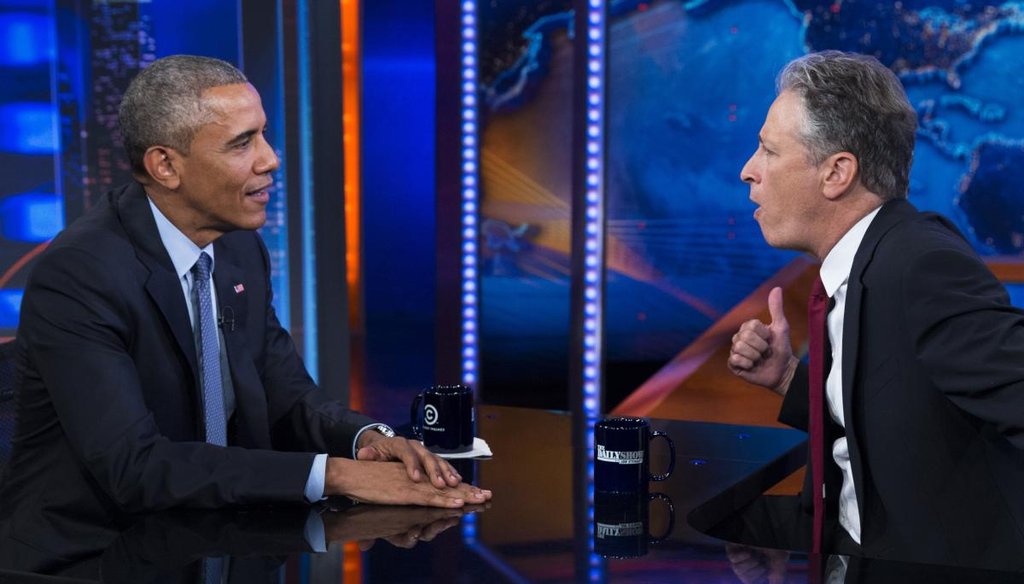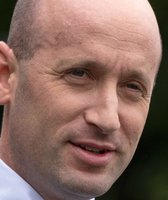Get PolitiFact in your inbox.

President Barack Obama, left, talks with Jon Stewart, host of "The Daily Show" during a taping on Tuesday, July 21, 2015, in New York. (AP)
President Barack Obama's last turn on The Daily Show with Jon Stewart had familiar elements that we've come to expect from his six earlier appearances since 2005: There were some wisecracks, some laughs and some questions about hard policy.
After mentioning his "executive order" requiring Stewart to stay on as the show's host, Obama ticked off a few accomplishments during his more than six years in the White House.
One of his claims was more accurate than the other.
The economy
Obama said, "The economy, by every metric, is better than when I came into office."
On a few big economic indicators — gross domestic product, unemployment rate and employment level — the country is in a better place than when he first took office. GDP per capita increased by 16 percent to $54,630 from 2009 to 2014; the unemployment rate is down from 10 percent in October 2009 to 5.3 percent in June 2015. And jobs have increased by almost 6 percent since the start of Obama's first term.
But there are a few significant measures that show the economy is not better than Obama started. Those include decreases in real median weekly earnings and median income and increases in the percentage of people in poverty and median weeks unemployed.
"Every" was too strong of a word, so PolitiFact rated his claim Mostly False.
Homeless veterans
The economy wasn't the only place of improvement that Obama highlighted in his interview. He also pointed to what his administration has done for homeless veterans.
"Let’s take something like homelessness among veterans. So we’ve cut that by a third," Obama said.
The numbers that are available back him up.
The National Alliance to End Homelessness' website says there has been a 33 percent decrease in the number of homeless veterans since 2010, pointing to an annual tally of homeless veterans called "point in time" that is reported to the federal government.
The U.S. Department of Housing and Urban Development's Annual Homeless Assessment shows there were 49,933 homeless veterans in 2014, according to the point in time count, a 32.57 percent decrease from the 2009 count of 74,050.
The caveat with this data is the element of uncertainty — counting techniques vary by city, so the process is not uniform. Moreover, the fight to end homelessness among veterans has not exclusively been a priority of the Obama administration, as it has received bipartisan support in Congress.
Obama's claim rates Mostly True.
The deal with Iran
Stewart also met the Truth-O-Meter for his attempt to set the record straight about the United States' relationship with Iran after the nuclear deal.
"Let me ask you a question about Iran. Whose team are we on in the Middle East?" Stewart said. "So we're fighting with Iraqis to defeat ISIS along with Iran. But in Yemen we're fighting Iran with Iraqis and Saudis."
"That’s not quite right," Obama laughed, "but that’s okay."
Obama didn't say what Stewart got wrong, so we decided to look into it.
Experts said Stewart's setup was right in a sense, but he inflated Iran's role in the fight against ISIS in Iraq and overstated the conflict in Yemen (which Iraq is not involved in).
Iran and the United States have a common enemy in ISIS, but that's where the similarities end. They are not cooperating as allies in air strikes against the terrorist group, and Iran is not part of the 60-member coalition the United States mobilized for attacks.
In Yemen, they are on opposite sides of the conflict, but they are not fighting directly. The United States is lending military "logistical and intelligence" support to the Saudi Arabia-led Gulf Cooperation Council fighting the Houthi militia. Iran, however, is suspected of arming and training Houthi forces, though Iran denies this.
Stewart's claim was partially accurate but needed additional context, so it rates Half True.
Stewart's last show is Aug. 6.
Our Sources
See fact-checks.












































